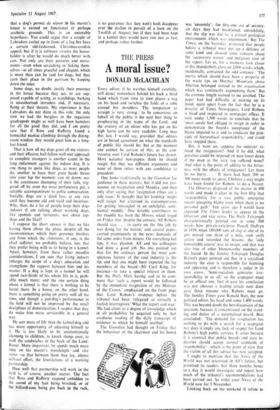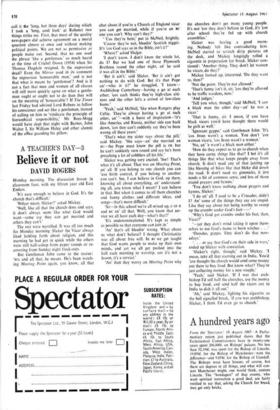A moral issue?
THE PRESS DONALD McLACHLAN
Every editor, if he watches himself carefully, will detect somewhere behind his back a third hand which from time to time places a wig on his head and twitches the folds of a robe around his shoulders. The temptation to arraign is very strong: to be censorious on behalf of the public is the next best thing to prophesying in the name of the Lord; and the oratory of an editor who has got on his high horse can be very readable. Long may this last, I would say, provided that editors are in broad agreement on what the standards of public life should be; but at the moment one cannot be certain of this, as the con- troversy over Lord Robens's future has shown. Most national newspapers think he should resign; but they use different arguments and none of them refers with any confidence to precedent.
One looks traditionally to the Guardian for guidance in these matters; but it did not pro- nounce on resignation until Monday, and then only after saying that 'resignation ethics are a side issue.' It thought that his lordship 'might well resign' but criticised its contemporaries for getting 'entangled in an unhelpful, senti- mental muddle.' One notable contributor to the muddle has been the Mirror, which urged on Friday that 'despite the censure, Alf Robens should stay . . . to carry on the fine job he was doing for the nation,' and several papers carried prominently in the news demands of the same order from miners. On everything but tips, it was pleaded, Alf and his colleagues had done a good job. No one pointed out that for the ordinary person the most con- spicuous feature of the coal industry is the tip, and that one might have expected the lay members of the board—Mr Cecil King, for instance—to take a special interest in them. But the Daily Mail, having said in its com- ment that 'such a report would be followed by the immediate resignation of any Minister of the Crown.' emphasised on the front page that Lord Robens's evidence before the tribunal had been 'relegated as virtually a foolish interruption.' What the report said was: 'He laid claim to a degree of knowledge which in all probability he acquired only by that assiduous reading of the daily transcript of evidence to which he himself testified.'
The Guardian had thought on Friday that the behaviour of the chairman and his board was 'unseemly': for fifty-one out of seventy- six days they had maintained, untruthfully, that the slip was due to 'a critical geological environment which was uncommon.' But The Times, on the Saturday. protested that people before a tribunal must put up a defence of some kind and showed some concern about the 'accusatory nature' and indignant tone of the report. Let us, for a moment, look closer at this thunderbolt, close on 2,000 words, which, incidentally, contained the odd sentence: 'The inertia which should have been a property of the waste tips on Merthyr Mountain above Aberfan belonged instead to the organisation which was continually augmenting them.' But the extreme length seemed to me justified. The paper had had difficulty in making up its mind; quite apart from the fact that he is a director of Times Newspapers, Lord Robens is liked and respected in newspaper offices. It took under 1,500 words to conclude that he 'must surely feel obliged to resign in order to demonstrate the board's acceptance of the blame imputed to it and to vindicate the prin- ciple of hierarchical responsibility,' and could have stopped there.
But, it went on, suppose the minister re- fused the resignation? And if he did, what penalties could be imposed on men lower down if the man at the very top suffered none? And what is the point of adding to the bitter- ness with the effects of vengeance? Let there be no hurry. . . . If there had been 200 or 300 more words to spare, I believe a way might have been found for Robens to do a Nasser.
The Observer disposed of the matter in 400 words and made it clear in the first fifty that -responsibility for a vast public enterprise means accepting blame even when there is no personal guilt.' Ten years ago I would have expected The Times leader to appear in the Observer and vice versa. The Daily Telegraph characteristically pointed out in some 500 words how private-enterprise Powell Duffryn in 1939, when 180,000 tons of slag at one of its pits moved one third of a mile, took swift action and recorded the lessons; the 'only honourable course' was to resign, and that was also true of other blameworthy members of the board. In the Sunday Telegraph Douglas Brown's piece pointed out that in a socialised industry the state is responsible for licensing and operating and is therefore a judge in its own cause. Semi-socialism generates irre- sponsibility in us all,' so the scapegoat must be an official one. Just in case his conclusion was not obvious a leading article next door gave three reasons why Robens must go. The Sunday Times gave Ronald Butt, the new political editor, his head and some 1,400 words. This was beyond doubt the best discussion of the question, because it concentrated on the stand- ing and duties of a nationalised board. Butt concluded: 'The demand for resignation has nothing to do with a search for a scapegoat nor does it imply any lack of respect for Lord Robens's high public services. It arises because it is essential that public boards and state in- dustries should accept normal standards of responsibility'—which is the point of view that the victim of all this advice has now accepted.
I ought to mention that the News of the World was not interested in All's future, but promised its readers that three months hence to a day it would investigate and report how much of the tribunal's recommendations had been carried out. So order your News of the World now for 5 November.
LOoking back on the weekend (I refuse to
call it the 'long, hot three days' during which I took a 'long, cool look' at Robens) two things strike me. First, that most of the quality newspapers did achieve agreement on a moral question almost at once and without making political points. We are not as permissive as people make out. Second, that no one used the phrase 'like a gentleman.' so much heard at the time of Crichel Down (1954) when Sir. Thomas Dugdale resigned. Is the expression dead? Even the Mirror used in its comment the expression 'honourable man,' and is not that what is meant by 'gentleman'? And is it not a fact that men and women of all classes will still more quickly agree on what a gentle- man ought or ought not to do than they will on the meaning of 'honourable'? If The Times last Friday had advised Lord Robens to follow his conscience and act like a gentleman, instead of calling on him to 'vindicate the principle of hierarchical responsibility,' Mr Rees-Mogg would have slept that night with Barnes, John Walter I, Sir William Haley and other alumni of the office guarding his pillow.































 Previous page
Previous page